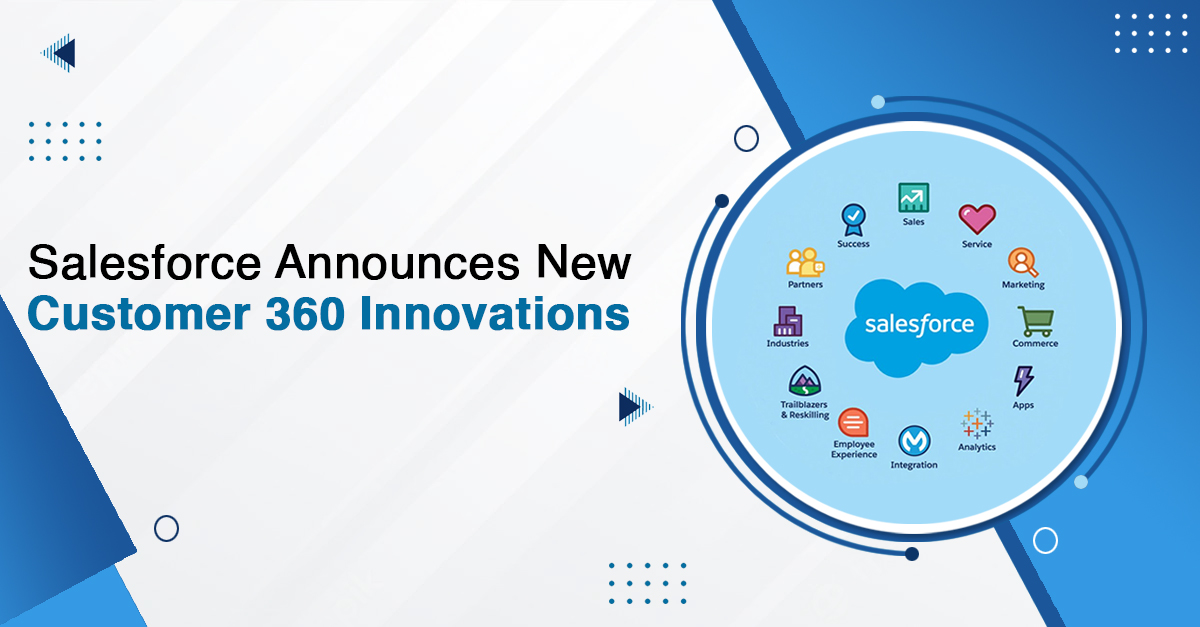Salesforce recently introduced new Customer 360 innovations that help to connect, commerce, marketing, and service data on one platform so companies can personalize every single interaction using insights from different departments.
Companies these days face mounting pressure to do more with less, all while striving to meet the rising consumer expectations. Ongoing changes in data privacy laws make it difficult to meet those expectations, and we can expect a cookie-less future to be fast-approaching.
This is where it is important to implement the next-gen Marketing and Commerce Clouds to give organizations new ways to deliver unique, connected and personalized experiences.
Customer 360 Innovations Across Marketing Cloud
Marketing Cloud makes it easy to humanize every interaction, making marketers more efficient. Let’s have a look at some of the recent innovations:
1. Triggered Campaign Messages
The feature helps bring together Marketing Cloud Personalization and Engagement to deliver personalized, 1:1 customer engagement based on behavioral triggers new product catalog. Organizations can utilize data to understand preferred products by customers and engage with them when they are back in stock or on any active sale.
2. Intelligence Connector for B2C Commerce Cloud
This connector helps to combine orders and product data to gain insights into revenue, product, and sales performance over time.
Businesses using Marketing Cloud can now automate data integration and understand where to spend to achieve an increase in ROI across campaigns, channels, and products. For example, marketers will be able to see the number of orders placed during a promotion, or the top three products ordered from different demographics in real-time.
3. Salesforce Customer Data Platform and Google Ads
Brands can automatically connect their data from different departments in a unified customer profile. It will help them to plan efficiently plan and optimize their Google Ads campaigns.
With this capability, marketers can deliver personalized campaigns using the first-party data they have instead of cookies. Also, in the near future, marketers can incorporate segment-level insights into the interface of the Customer Data Platform.
4. Intelligence Ecommerce Marketing Insights
This is the app that unifies a company’s commerce and marketing data. It enables marketers to access it all on a single platform, using actionable insights to generate interactive dashboards.
Customer 360 Innovations Across Commerce Cloud
Here are some new features with which Commerce Cloud will bring a new approach to digital commerce:
1. NFT Cloud
Salesforce’s NFT Cloud, which is now in the pilot, can help businesses expand customer experiences to Web3 environments in a trusted and sustainable manner.
It can help you manage and sell non-fungible tokens (NFTs) directly on the Salesforce Customer 360 Platform and connect customer data securely to gain a 360-degree view.
2. Social Integration for Commerce Cloud
With the help of Social Integration, businesses can create and automate product feeds, publish ads, and segment audiences while finding and targeting new audiences. They can even create TikTok ads that will redirect to their commerce websites.
3. Commerce for Customer Service
Commerce Cloud will have new capabilities that give agents a complete view of order history across channels through which service departments can transform into revenue drivers.
The feature will give them the ability to issue exchanges, returns, promotions, or complete orders, without the need of transferring them to other departments.
4. Commerce Marketplace
Businesses can create, manage, and scale a marketplace solution quickly on Commerce Cloud. It enables them to extend their catalog range with products from other companies and reach new buyers and channels. This can help brands drive new revenue streams, leading to an increase in cart sizes and membership subscription fees from vendors.
Get Access to These New Customer 360 Innovations with Certified Experts
All these enhancements could take your productivity and work efficiency to a great level. But make sure you get expert guidance on what features would be right for you.
Hiring Salesforce consultants would simplify your way to plan and work through these new Customer 360 innovations and maximize your capability of working with Salesforce.


